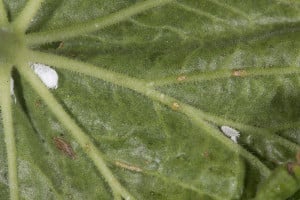Do you see white stuff forming on the limbs and leaves of your potted plants? Your first instinct might be to think that it’s mold, but really you are likely seeing a civilization of mealybugs in your potted plants. Mealybugs are teeny-tiny creatures that breed a new generation every 30 days, more and more mealybugs equals more and more white stuff that looks like cotton. So how much damage can mealybugs really do to your plants? And more importantly perhaps, how do you get rid of Mealybugs in your potted plants? Here we provide answers all about mealybugs!
What’s That White Stuff On My Plants?!
While mealybugs depend on the white Honeydew they produce, it’s also their downfall and what always gives them away; when you see the clumps of white clinging to your plant you know something must be wrong.
It looks like cotton, but Honeydew is actually sticky oil continually secreted by mealybugs. Inside of this mass buildup of white, the female mealybugs bury their eggs—around 600 at a time, no big deal. In 10 days these new mealybugs will hatch, further infesting your plant. Not only does this waxy white stuff protect un-hatched mealybugs, but it also coats the mealybug with an extra layer of protection. Without Honeydew, mealybugs are soft-bodied and easy to kill (More Information).
4 Reasons You Need To Get Rid Of Mealybugs In Your Potted Plants
1. Rapid Reproduction
Mealybugs reproduce fast, every 30 days an entirely new generation is born, and each female goes on to lie up to 600 eggs. At these rates the population just grows and grows (Read more).
2. Rotten Fruit & Flowers
If mealybugs get a chance to attack a plant that bears fruit or flower buds, the leaves, buds and fruits will often start to fall premature.
3. Mealybugs Dehydrate Your Plants
In order to sustain life, mealybugs feast on your plant, basically sucking it dry patch by patch. With time the leaves will yellow and fall away because there will be no juices left, the mealybugs drained it dry.
4. Promotes Mold
If there is a true infestation of mealybugs in your potted plants, all excreting tons of honeydew, the chances for a sooty mold to develop become more and more likely.
How To Get Rid Of Mealybugs Naturally
Mealybugs create an eye sore and a potential harm to your agriculture, plus the longer they are able to sustain life the larger, and more damaging, the infestation will become. Here are some natural ways to get rid of mealybugs.
Spray Mealybugs With Water
If you pour a steady stream of water over mealybugs in your potted plants you will see many of them instantly flying away, these are the male mealybugs—the females don’t have wings. You will notice that it’s not easy to wash the white stuff away because it’s sticky, but if you continue to dose your plant with streams of water it will begin to come loose. You will need to repeat this process multiple times each day until no mealybugs persist, although if you have anything more than a mild infestation, you might need to take some other steps to prevent them from coming right back.
Add Kick To Your Water
You can give water more killing power by adding an insecticidal to your concentrated water mix. It’s the potassium salts found in fatty acids that actually kill mealybugs in your potted plants by penetrating their shell and dehydrating them to death in as little as 3 hours. Make sure not to use anything that will harm your plants though. If you decide to use a light dish-washing soap, in place of an insecticide, make sure it contains no perfumes or harmful additives that might damage your plants faster than mealybugs alone.
Remaining Mealybugs, Meet Cotton & Booze
Still see some mealybugs in your potted plants? Grab some cotton swabs and lather them up with alcohol. Rub around the plant where the remaining mealybugs persist, then let sit for a few days before thoroughly rinsing the alcohol off.
Plants Need Neem Oil
Spray neem oil onto the surface of your cleanly rinsed plant. Neem oil is natural so it won’t harm your plant, and is safe for use on plants that harvest fruits and vegetables. Neem oil gives your plants extra strength, adding a thick protective barrier against future mealybugs in your potted plants.

